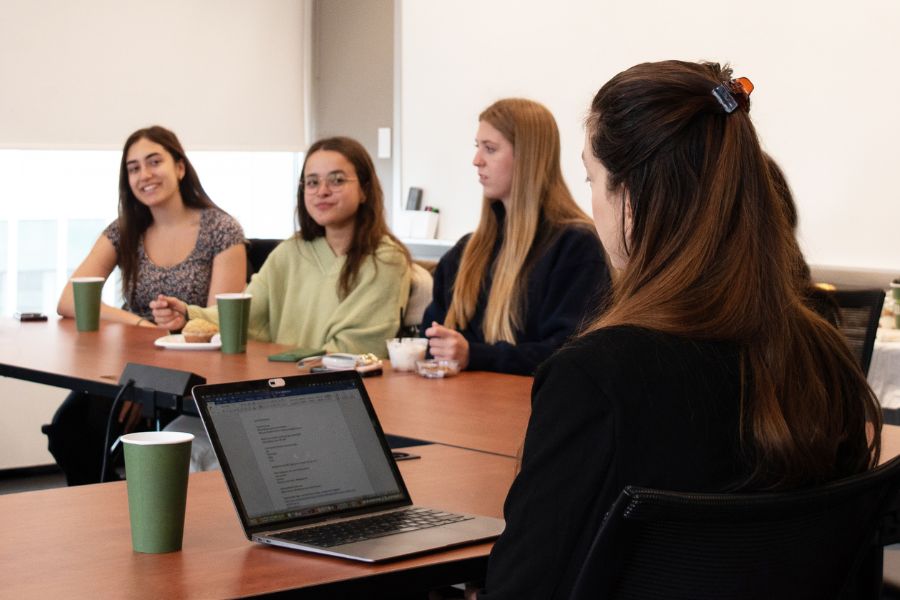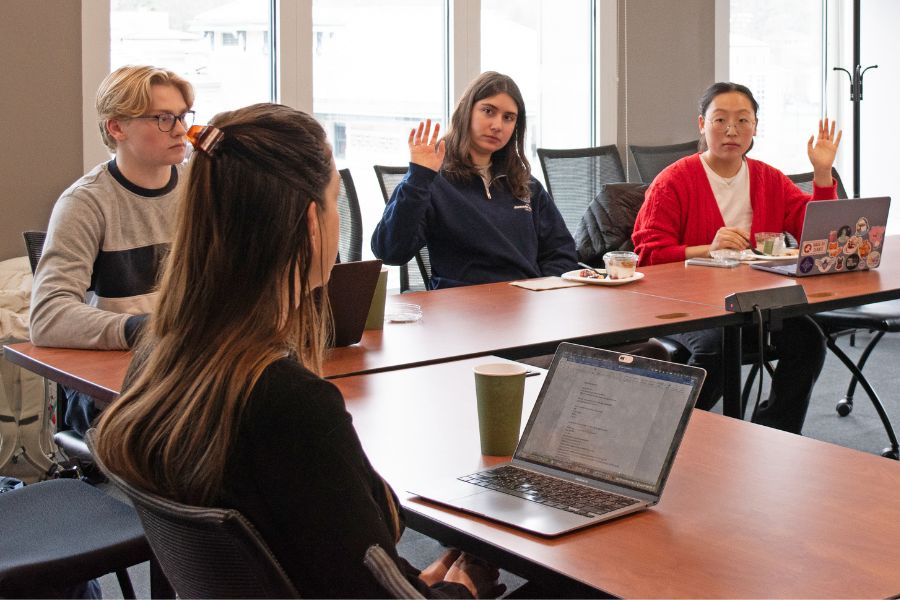
The Bartos Cycle: Preparing Students for the Professional World
By Aleksaundra Handrinos
Media Inquiries- Communications Specialist
Carnegie Mellon University (CMU) students preparing to enter the workforce are fortunate to be able to turn to the professional expertise of Haleigh Bartos. An associate professor of the practice at Carnegie Mellon Institute of Strategy and Technology (CMIST), Bartos brings to her role more than a decade of policy experience working in Washington, DC. In response to student concerns regarding current employment fragility, she offered a CMIST Summer Internship Workshop last month to help students maximize opportunities, garner search tactics, and develop strategies to optimize their break. Bartos’s willingness to extend beyond the classroom to host such an event speaks to her holistic approach, genuine care for students, and dedication to mentoring the next generation of professionals.
Addressing a room of eager students, Bartos reviewed general tips for writing resumes and cover letters, provided real-time edits and suggestions, and spoke about best practices for searching for internship opportunities. She emphasized the importance of using the situation, action, result, impact, or SARI, format to describe each listed experience to make a resume stand out. While asking each student about their ambitions for summer, Bartos encouraged them as a whole to seek opportunities on Capitol Hill. In addition to tailored suggestions, Bartos provided overall advice that students should look for potential internships at familiar organizations and offices. She reminded students that it is okay to prioritize certain life experiences or locations, because everything has a tradeoff. Attendees left with an actionable to-do list, a noticeable sense of calm, and the promise of a second event later that month.

Professor Bartos “brings insight and genuine enthusiasm to everything she does,” commented rising senior Catherine Vassiliadi after attending the internship workshop. Vassiliadi, who is studying international relations and political science, characterized Bartos as a dedicated mentor who “encourages her students to reach their full potential, while offering thoughtful guidance grounded in her own professional experience.”
Bartos not only teaches students in the classroom but also assists them in applying that knowledge in real-world opportunities. This event prepares them to do just that and serves as a step in the “Bartos Cycle,” an approach to helping students that she describes as “teach, support, apply, experience, then learn again but ready to apply more independently.” Seeing students come full circle, excelling in such experiences, is her favorite part of being a professor.
One of Bartos’s courses, Tomorrow’s Professionals, is a requirement for students who are planning for the CMU Washington Semester Program (CMU/WSP) and is designed for them to enter into their internships feeling well-equipped. The goal is for students to fully understand the DC operating environment, with Bartos there to assist them as they go about applying for internships. Her aim is “to teach students to be practitioners” and “to know how to do the jobs they want before they get into the jobs they want.” From building resumes to reviewing cover letters to conducting mock interviews, Bartos ensures that students have the necessary support, both during this mini-course and after its conclusion, to obtain exciting opportunities for their experience during CMU/WSP.
To further prepare for the fields of international relations, government, politics, and policy, students can turn to Bartos’s Briefing in the Policy World to equip them with the presentation skills necessary for conveying information effectively and efficiently. Students leave this fast-paced, workshop-based course ready to apply their skills in various settings, from briefings at the executive level to read-aheads and talking points for customers. Additionally, the professional development course, Mapping Your Future, open only to seniors, offers students the opportunity to set themselves up for success in the job search and to plan for a fruitful career after graduation.

In another one of Bartos’s courses, Writing for Political Science and Policy, students select their area of research. Bartos designed the class to teach the practice of political science and policy writing in a successful and engaging learning environment. The pillar of the course, the area of research, means that “everything is built around the students’ interests” and serves as the basis for students to explore the various writing techniques and assignments. While Bartos says this concept is part experiential in that it mimics the experience in the actual professional field, she structures the course to “give students as much authority and ownership as possible.”
Bartos’s lessons in this course meant that Colleen Moosman, who recently graduated from CMIST with a major in international relations and political science, “felt prepared to write memos and policy recommendations and provide oral briefings on various areas of interest” during her time interning on Capitol Hill for CMU/WSP. “I owe much of my growth to Professor Bartos,” she shared.
Priding herself on teaching students about the power of developing expertise, Bartos hopes to spark an interest that leads students to continue working on their areas of interest even after the course concludes. By selecting one topic for the entire semester, she has found that students are able to grow their knowledge and become more comfortable speaking professionally about the topic.
For Moosman, her research into the humanitarian situation in Yemen, undertaken during this writing course, sparked a passion that endured throughout her undergraduate career. This continued focus ultimately compelled her to write her Senior Honors Thesis on terrorism in the country, with Bartos as her advisor. “She is an incredible role model in our field, brilliant, and one of the most invested professors I’ve enjoyed getting to know,” Moosman remarked.
In all of her courses, Bartos emphasizes the importance of accountability: both in being on time for class and in submitting assignments. Long after their time with her, students who have taken even just one course with Bartos will often repeat to themselves “eighty percent there, one hundred percent on time,” a familiar saying in her classroom that stresses the importance of timeliness over perfection in the political science and policy field. Other core values in her teaching approach include respect and openness to feedback and differing points of view.
Trish Nhan, an economics and politics major who graduated this month, reflected, “Professor Bartos has made my experience at CMU transformative. She’s taught me so many skills that apply in the real world, from writing policy memos to what to wear on your first day of work. Professor Bartos has gone above and beyond to help me grow as a student and professional.” Even in semesters when she was not enrolled in one of Bartos’s courses, Nhan still felt care and support from her, saying, “It’s a testament to the kind of professor she is.”
Bartos has an impact on students throughout their entire college career. They develop foundational skills in her writing and briefing courses, benefit from her willingness to assist in the search for summer internships, prepare for CMU/WSP with her help, and become equipped for post-graduation through her professional development seminar. As she guides them through the “Bartos Cycle,” Bartos finds the one-on-one work rewarding. “Students flourish and get positions and internships and things that they have dreamed of,” she said, adding, “It’s just really pretty great to see that.”
In addition to her professional development courses, Professor Bartos also teaches Analysis of Current US National Security Priorities and Terrorism in Sub-Saharan Africa.
(Image 1: Students attend the CMIST Summer Internship Workshop offered by Prof. Haleigh Bartos in April; Image 2: Bartos responds to student questions)
